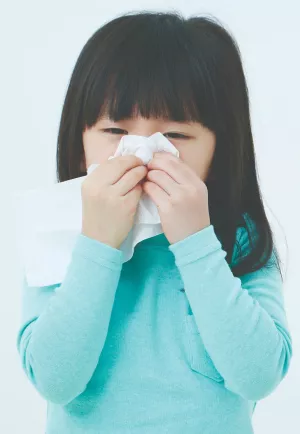Dr. Jennifer Murzycki, a Tufts Medical Center pediatric specialist practicing at Lowell General Hospital, says there are key differences that can help parents understand the potential severity and duration of their child’s illness.

Colds, croup, bronchiolitis and the flu can all include symptoms like fever and congestion. The biggest difference with the flu is how quickly it comes on.
“Some colds start out slow with mild symptoms like a runny nose, then build up to a cough and by day four or five you are at your worst, then you start to feel better – so increasing then decreasing,” she says. “With the flu, you’re fine and within hours you feel pretty sick, usually with higher fevers and more significant achiness and fatigue.”
Dr. Murzycki is chief of the Pediatric Hospitalist Program at Lowell General Hospital, where she and a team of physicians provide 24-7 coverage for the Maternal-Infant Unit, pediatric floor and pediatric emergency department. This extra level of specialized care is made possible through Lowell General’s partnership with Tufts Medical Center, a fellow member of the Wellforce system.
“Pediatric patients in this area are really fortunate to have round-the-clock access to our hospitalists,” Dr. Murzycki says. “Having at least one, if not two or three pediatricians on site means we can cover anything that might happen.”
This time of year, the pediatric specialists see a lot of viruses, many of which can come with congestion and high fever.
“If a child’s breathing is very fast or it seems like they are having a tugging around their neck or below their ribs, those are really important times to at least reach out to your primary care physician (PCP) and tell them what’s going on so they can tell if a child needs more attention,” she says.
If a child is struggling to keep down fluids due to coughing and/or vomiting, she says, it can limit their ability to heal and get better.
“We worry less about food, and much more about whether a child can tolerate formula or breast milk or Pedialyte®, depending on the age,” she says. “You can judge hydration based on whether a baby is still making wet diapers or a child is still going to the potty.”
Croup and bronchiolitis are also common this time of year. Both can cause difficulty breathing, making it a frightening experience for the child and parent.
With croup, the upper airway becomes inflamed, causing a barking cough, according to Dr. Murzycki. It usually responds well to humid air or cold, fresh air outside.
Bronchiolitis is very common in infants and toddlers, she says. It occurs when the small, end branches of the bronchial tubes in the lungs become inflamed. This results in a lot of mucus build-up and a wet cough.
Most of these conditions, while unsettling, do not require a trip to the emergency room or admission to the hospital. Unless you fear the condition is life-threatening, a call to the PCP or a trip to urgent care is typically more appropriate than a trip to the hospital, Dr. Murzycki says.
Of course, the best way to stay out of the doctor’s office this winter is by getting kids a flu shot and teaching them good hygiene habits.
“Keep that gel around the house and school,” she says. “Teaching kids good hand hygiene, coughing into their arm instead of their hand and using hand gel afterward are really helpful in infection control.”